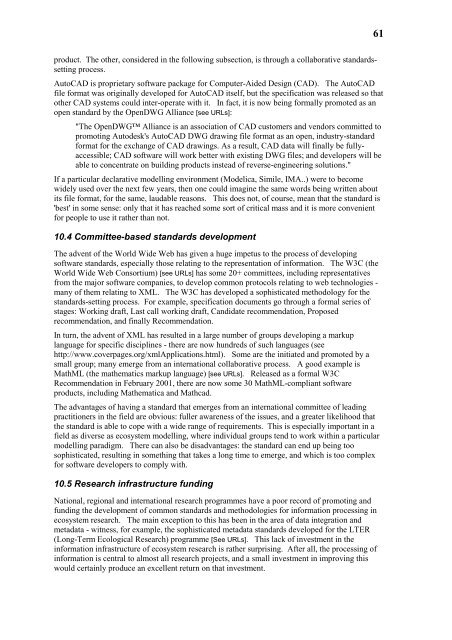pdf: 600KB - Potsdam Institute for Climate Impact Research
pdf: 600KB - Potsdam Institute for Climate Impact Research
pdf: 600KB - Potsdam Institute for Climate Impact Research
You also want an ePaper? Increase the reach of your titles
YUMPU automatically turns print PDFs into web optimized ePapers that Google loves.
61<br />
product. The other, considered in the following subsection, is through a collaborative standardssetting<br />
process.<br />
AutoCAD is proprietary software package <strong>for</strong> Computer-Aided Design (CAD). The AutoCAD<br />
file <strong>for</strong>mat was originally developed <strong>for</strong> AutoCAD itself, but the specification was released so that<br />
other CAD systems could inter-operate with it. In fact, it is now being <strong>for</strong>mally promoted as an<br />
open standard by the OpenDWG Alliance [see URLs]:<br />
"The OpenDWG Alliance is an association of CAD customers and vendors committed to<br />
promoting Autodesk's AutoCAD DWG drawing file <strong>for</strong>mat as an open, industry-standard<br />
<strong>for</strong>mat <strong>for</strong> the exchange of CAD drawings. As a result, CAD data will finally be fullyaccessible;<br />
CAD software will work better with existing DWG files; and developers will be<br />
able to concentrate on building products instead of reverse-engineering solutions."<br />
If a particular declarative modelling environment (Modelica, Simile, IMA..) were to become<br />
widely used over the next few years, then one could imagine the same words being written about<br />
its file <strong>for</strong>mat, <strong>for</strong> the same, laudable reasons. This does not, of course, mean that the standard is<br />
'best' in some sense: only that it has reached some sort of critical mass and it is more convenient<br />
<strong>for</strong> people to use it rather than not.<br />
10.4 Committee-based standards development<br />
The advent of the World Wide Web has given a huge impetus to the process of developing<br />
software standards, especially those relating to the representation of in<strong>for</strong>mation. The W3C (the<br />
World Wide Web Consortium) [see URLs] has some 20+ committees, including representatives<br />
from the major software companies, to develop common protocols relating to web technologies -<br />
many of them relating to XML. The W3C has developed a sophisticated methodology <strong>for</strong> the<br />
standards-setting process. For example, specification documents go through a <strong>for</strong>mal series of<br />
stages: Working draft, Last call working draft, Candidate recommendation, Proposed<br />
recommendation, and finally Recommendation.<br />
In turn, the advent of XML has resulted in a large number of groups developing a markup<br />
language <strong>for</strong> specific disciplines - there are now hundreds of such languages (see<br />
http://www.coverpages.org/xmlApplications.html). Some are the initiated and promoted by a<br />
small group; many emerge from an international collaborative process. A good example is<br />
MathML (the mathematics markup language) [see URLs]. Released as a <strong>for</strong>mal W3C<br />
Recommendation in February 2001, there are now some 30 MathML-compliant software<br />
products, including Mathematica and Mathcad.<br />
The advantages of having a standard that emerges from an international committee of leading<br />
practitioners in the field are obvious: fuller awareness of the issues, and a greater likelihood that<br />
the standard is able to cope with a wide range of requirements. This is especially important in a<br />
field as diverse as ecosystem modelling, where individual groups tend to work within a particular<br />
modelling paradigm. There can also be disadvantages: the standard can end up being too<br />
sophisticated, resulting in something that takes a long time to emerge, and which is too complex<br />
<strong>for</strong> software developers to comply with.<br />
10.5 <strong>Research</strong> infrastructure funding<br />
National, regional and international research programmes have a poor record of promoting and<br />
funding the development of common standards and methodologies <strong>for</strong> in<strong>for</strong>mation processing in<br />
ecosystem research. The main exception to this has been in the area of data integration and<br />
metadata - witness, <strong>for</strong> example, the sophisticated metadata standards developed <strong>for</strong> the LTER<br />
(Long-Term Ecological <strong>Research</strong>) programme [See URLs]. This lack of investment in the<br />
in<strong>for</strong>mation infrastructure of ecosystem research is rather surprising. After all, the processing of<br />
in<strong>for</strong>mation is central to almost all research projects, and a small investment in improving this<br />
would certainly produce an excellent return on that investment.
















